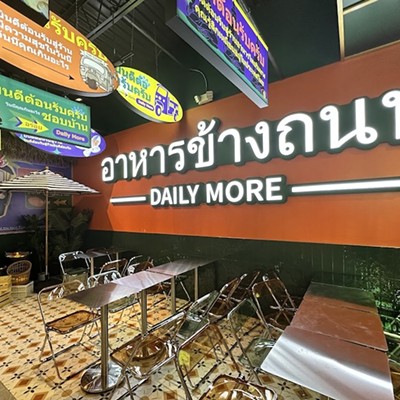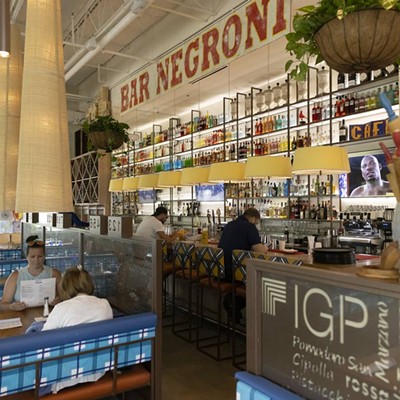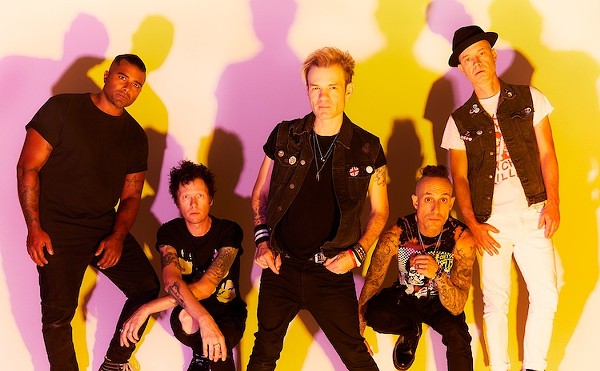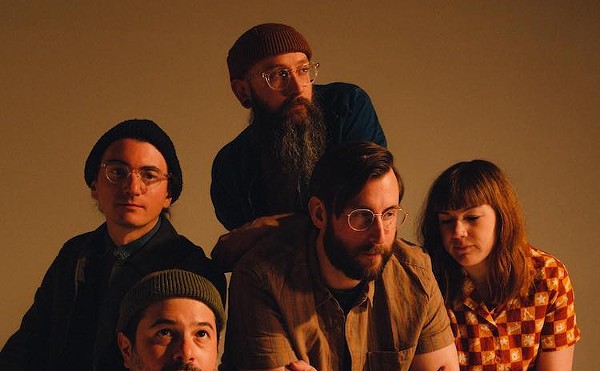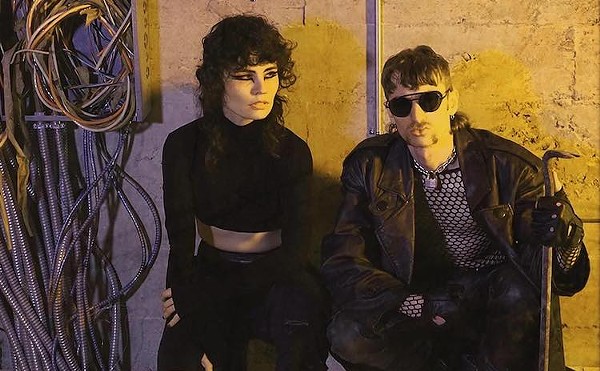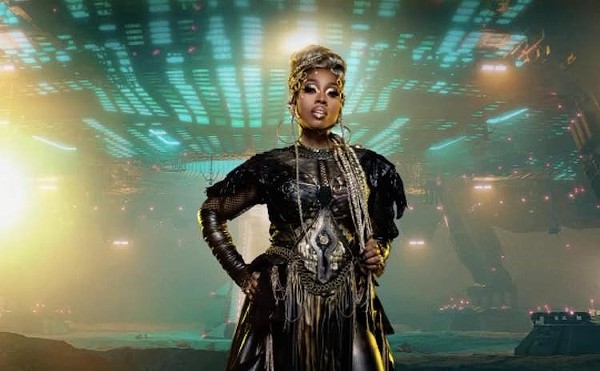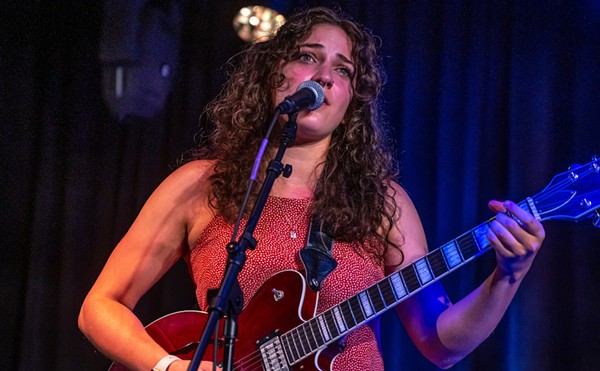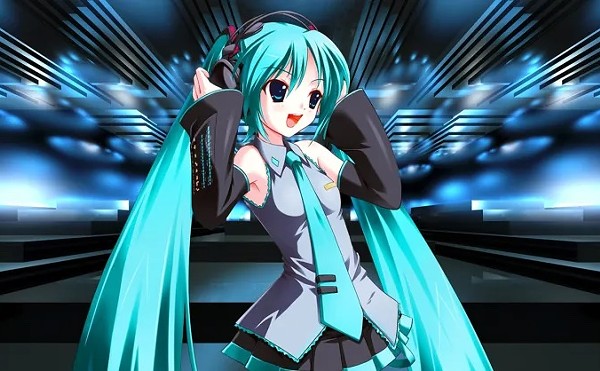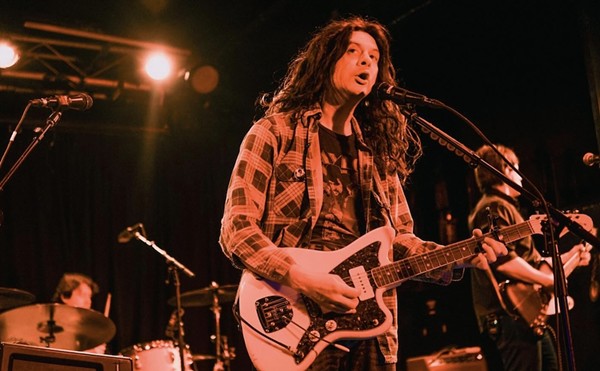Fishbone
with the English Beat
7 p.m. Tuesday, Feb. 16
Firestone Live
$18-$20
all ages
www.firestonelive.net
$18-$20
It was 1988, and America was scared of black people again. Willie Horton's mug shot spearheaded fear and loathing directly into homes and the polls, where voters hurriedly punched the ticket for Reagan's veep to take office. One more for the Gipper.
Yet just days following Bush's election victory, six black men stood before an ecstatic crowd of white kids outside a private, predominantly white Presbyterian college situated on Florida's waterfront. By day's end, a conga line of students flooded the field. They danced at the direction of a shirtless man in suspenders who, at 23, had maybe a year or two on the students he and his band came to entertain.
For Fishbone, an energetic sextet of horn players from Los Angeles, this was déjà vu all over again, minus the gym bleachers. The band first played together at their high school's Battle of the Bands competition.
"We won," remembers Fishbone frontman and saxophonist Angelo Moore. The public-school system, odd as it seems, can claim the credit for Fishbone's formation. The daily, hour-long bus ride from their South Central Los Angeles homes to a white school in the San Fernando Valley would be the first in a series of bumpy travels over the next 30 years.
Too young to drink, Fishbone played any club that would allow them inside the bar. The young band's act, a funky hybrid of reggae grooves and aggressive punk, barely drew flies even on a good night. But David Kahne, one of a handful of people at a Santa Monica club one evening in 1983, decided to sign Fishbone within seconds of hearing them perform.
"I knew right at the beginning, the way the high-hat felt on ‘Skankin' to the Beat,'" says Kahne, a former Columbia Records representative. "They could actually play ska on top of shuffles and make it work."
But they were black. Record executives argued that Fishbone, for all their eclectic energy and engaging onstage theatrics, were too tough to market. "This isn't R&B. This sounds like rock," the head of Columbia's black music division complained to Kahne. The label had never before encountered musicians who dared fuse reggae with hardcore, ska with funk. By the time Fishbone got to Columbia the company was already making well over $100 million off its black artists. Why should the label risk losing its shirt over a potential promotional disaster?
Kahne signed Fishbone anyway, and in 1985 the band sold more than enough copies to cover the $15,000 it cost to make their first EP. Word of the band's ingenuity had gotten out. A young Perry Farrell dropped by the studio to watch Fishbone at work. Then the Red Hot Chili Peppers invited the group to sing on a record; 30 live dates with the Beastie Boys followed. Before long, Bob Dylan was calling Fishbone his favorite band.
Fishbone's bouillabaisse of Parliament-Funkadelic sex, smooth Family Stone passion and thrusting Bad Brains intensity had clearly intoxicated the band's peers, like the Chili Peppers, Living Colour and 311.
"Fishbone pioneered a way of rocking with complete abandon that made our jaws drop," says 311 lead vocalist Nick Hexum. "Truth and Soul is an unrivaled masterpiece."
A maddening, guitar-driven interpretation of Curtis Mayfield's "Freddie's Dead" opens Truth and Soul, Fishbone's bombastic 1988 funk-metal opus. Moore's pleading lyrics of politics and bitter childhood scars lock his listener into the dysfunctional crosshairs of divorce battles and child-custody warfare — common themes throughout Fishbone's output.
"With ‘Ma and Pa' and ‘Drunk Skitzo,' I was writing them from a victim's point of view," says Moore. "Now, I take them from a storyteller's point of view. That way it's not like, ‘Oh my God, I gotta sing about this torturous time in my life again.'"
Fishbone join their friends and British ska-reggae counterparts the English Beat on tour for 15 shows this month. "Fishbone connect to a crowd like few others," says Beat frontman Dave Wakeling. While the Beat works this year to complete Twelve Orgasms in an Hour, their first studio album since 1982, Fishbone lacks concrete plans for further studio work.
"Not at the present moment, but we have a lot of unfinished songs that are still hanging in the midst `that` we would still like to finish," says Moore, whose band has remained stuck outside the charts since 1993.
"Fishbone not really breaking through is, and will be, the biggest disappointment of my career," admits Kahne, the band's former producer. Fishbone has outlived seven albums, creative hijacking by many of their industry peers and the occasional high-profile arrest. Other than Moore, only one original Fishbone member remains with the band. "I'm hard on my hair," says Norwood Fisher, the group's bassist, from outside his beach house in Santa Monica. Too much surfing has rendered his hair — a single, foot-long dreadlock Fisher calls "the sacred antenna" — damaged to the point of virtual disintegration. Fisher's antenna, though, like the band, still stands despite near-breakdowns over the years. "I love the beauty of the fallacies and mistakes that we make. It's what makes us strive toward making great art," says Fisher.
Fisher laughs as he recalls Columbia's resistance all those years ago. "At the end of the day," he says, "if you're confounding the guys in suits and ties, you might be doing something right."
[email protected]

